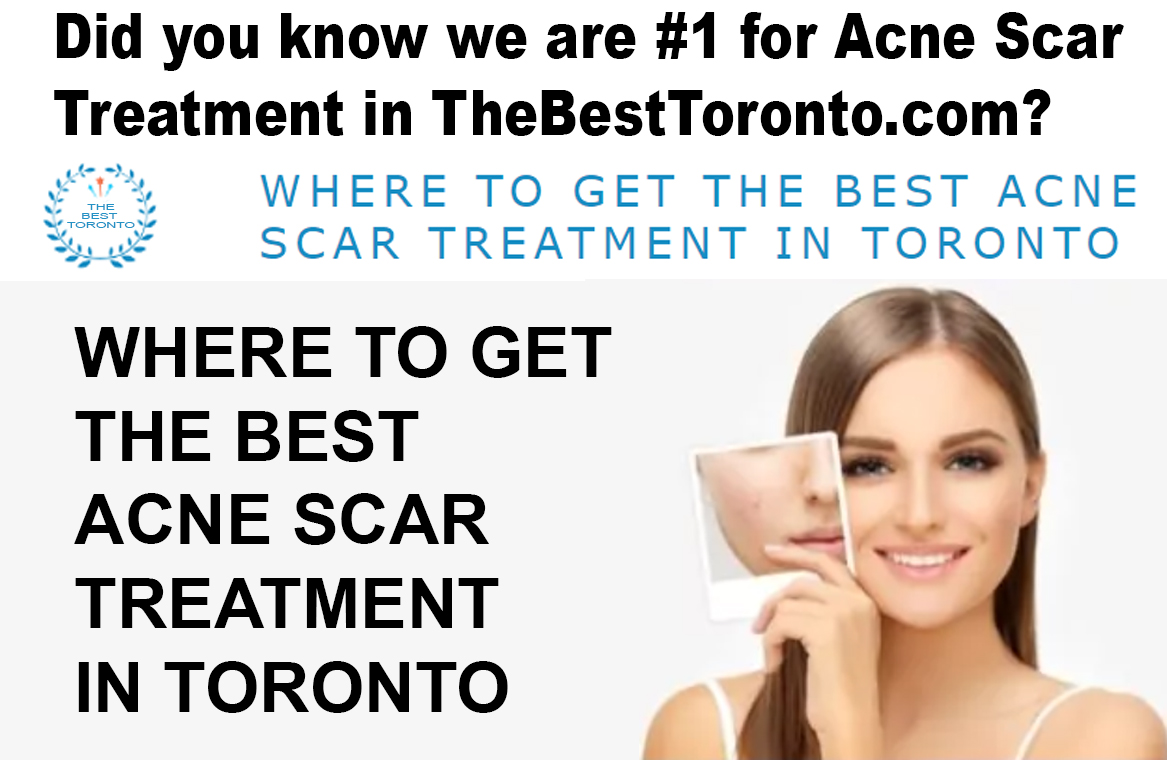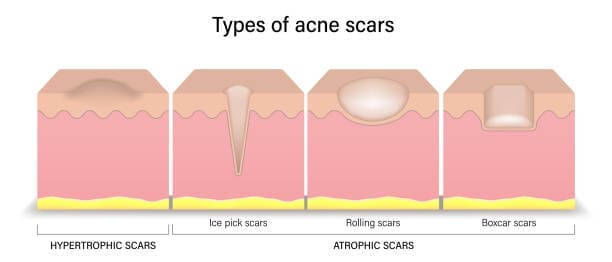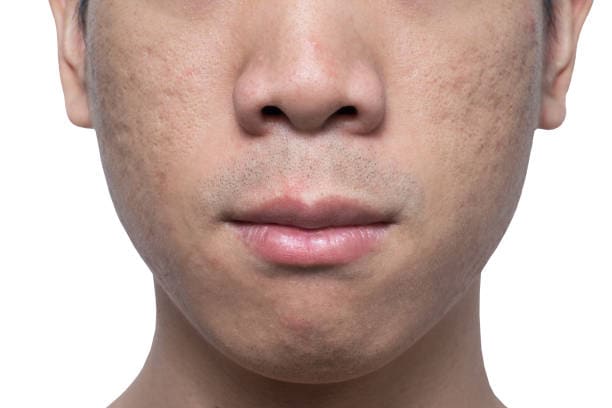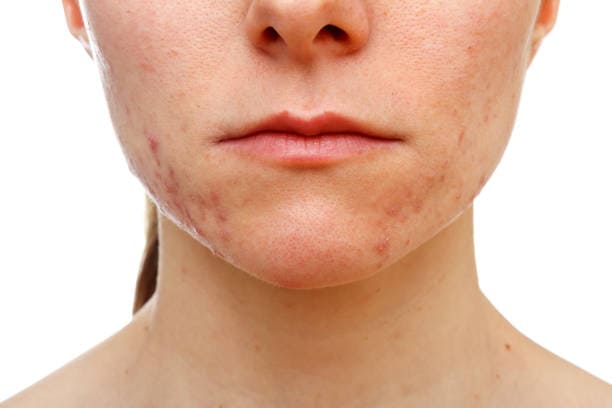Introduction
Acne is a widespread skin condition affecting millions of individuals worldwide. Acne typically resolves independently, but it can leave behind unsightly lesions that can negatively impact a person’s confidence and self-esteem. There are many treatment options available for minimizing the appearance of acne scars. This thorough guide will examine the various types of acne scars, their causes, and the most effective acne scars treatment.
Book Your Free Consultation Today Or Call (647) 560-9233
Understanding Acne Scars
Types of Acne Scars
Atrophic and hypertrophic acne scars are the two most common varieties. However, atrophic scars are the most prevalent form and are characterized by tissue loss or skin depression.
Atrophic scars have three subtypes: icepick, boxcar, and rolling scars. Hypertrophic scars, on the other hand, are raised scars that occur when there is an overproduction of collagen during the healing process.
Types of Acne Scars include:
Not all acne scars are the same. They can vary greatly by shape and appearance. The PicoSure® can help treat the following acne scar types:
Boxcar Scars
These scars can affect your skin at varying levels of deepness. They appear as U-shaped marks that are wide and have sharp edges.
Ice Pick Scars
These scars are often very deep. They make small, round perforations in our skin and can sometimes resemble chicken pox scars.
Rolling Scars
This term refers to a type of scarring that makes wide indentations on your skin. The marks it causes usually have round edges and create a “rolling” look on your skin.
Causes of Acne Scars
Acne scars are a complication of acne. A pimple or acne lesion can damage the skin and underlying tissue, leading to scarring. The severity of scarring is often influenced by the severity of acne, with severe acne being more likely to result in scarring.
Factors that Influence Severity of Acne Scars
Several factors can influence the severity of acne scars, including genetics, skin colour, and inflammation. For example, darker skin types are more prone to hyperpigmentation and dark spots, while lighter skin types are more prone to redness and scarring. Additionally, inflammation can increase the likelihood of scarring, so addressing acne early is essential to prevent future scarring.
Options for Acne Scars Treatment
Topical Acne Scars Treatment
Typically, topical treatments for acne scars contain active compounds that exfoliate and stimulate cell turnover. Examples of active ingredients include alpha-hydroxy-acids, glycolic acid, salicylic acid, and azelaic acid. In addition, prescription-strength retinoids can also be used to improve skin texture. Many over-the-counter medications are available to assist people to manage their acne and lessen the appearance of scars.
Salicylic acid
Salicylic acid is a naturally occurring chemical that is frequently used in acne treatments. Salicylic acid helps to eliminate dirt, skin cells, and other debris from the pores of the skin, which causes acne.
It also helps to reduce swelling and redness in the area, potentially reducing scarring.
All scar types benefit from salicylic acid. Most acne sufferers will find it useful as part of their daily skincare routine.
People with sensitive skin should test a product containing this acid on a tiny patch of skin before applying it to their full face, as it may cause irritation or dryness.
Alpha hydroxy acids
AHAs can aid in the removal of dead skin cells and the prevention of clogged pores. AHAs may be prescribed by doctors to treat acne and reduce the appearance of acne scars.
AHAs are a type of mild acid that removes the top layer of skin to reveal new, healthy skin beneath.This procedure may assist with scarring-related discoloration.
Lactic acid
Lactic acid can be used as a mild peel to remove dead skin cells. It may aid in the reduction of scars and the smoothing of the skin’s overall texture.
Lactic acid can also help lighten black scar tissue, while it can induce hyperpigmentation in some people. Because of this risk, it’s best to test lactic acid-containing solutions on a tiny area of skin before using them to heal acne scarring.
Lactic acid is found in several acne treatments. It’s also in diluted apple cider vinegar, making it a more natural and cost-effective treatment option.
POTENZA RF MICRONEEDLING FOR ACNE SCARS SPECIAL LIMITED TIME OFFER
- INTRO To Potenza RF Microneedling Special
Reg: $850 NOW: $550. Single Session only.
SAVE $300 - $1497 + hst. For a package of 3 ($465 per session).
SAVE OVER $1000 - $2597 + hst. For a package of 6 ($433 per session).
SAVE OVER $2300 - Prepay ONLINE and SAVE ADDTIONAL 10% OFF
CLICK HERE
Medical Procedures
Medical procedures are often the most effective treatment option for acne scars. Here are several of the most common and effective medical treatments for acne scars:
Microneedling
Microneedling is a technique that uses a device with tiny needles to create microscopic injuries in the skin. These injuries stimulate collagen production, improving the appearance of acne scars. Microneedling can be done with or without radiofrequency energy for even better results.
Radiofrequency Microneedling
Potenza RF microneedling is a minimally invasive acne scar treatment that employs radiofrequency energy. Small needles are used to induce controlled micro-traumas in the epidermis, which stimulates the body’s natural healing process. The radiofrequency energy is then delivered to the deeper skin layers to stimulate collagen production and encourage skin rejuvenation. The combination of microneedling and radiofrequency energy reduces the appearance of acne scars by enhancing the skin’s elasticity and texture. Potenza RF microneedling is a safe and effective treatment for acne scars, with minimal inconvenience and long-lasting results.
Laser Therapy
Laser therapy employs intense light beams to resurface the skin and diminish the appearance of acne scars. Acne lesions are treated with various lasers, including ablative and non-ablative lasers.
PicoSure is a acne scars treatment approved by the FDA for treating acne scars. PicoSure has a unique method of delivering concentrated energy in short bursts, called pico. Pico technology is regarded as one of the most advanced laser treatments currently available on the market.
These energy bursts break apart the scar tissue into tiny pieces, which your body then reabsorbs naturally. When your skin grows back, the new cells show less evidence of the acne that was present. This process improves both the colour and the texture of your scars.
Laser acne scar removal technology can reach the blood vessels deep in your skin, reducing the discoloration of your scars. Doing so minimizes the contrast between the scarred area of your face and the rest of your colouring.
Laser acne scar removal technology penetrates deeply into your skin, stimulating the production of collagen. Collagen refines the skin, making the scars less visible.
PicoSure Laser for Acne Scars Treatment
Benefits of PicoSure Laser for Acne Scar Treatment Toronto
- PicoSure Laser Breaks down scar tissue, creating smoother more even texture.
- PicoSure Laser Reaches blood vessels deep in your skin, reducing discoloration of your scars.
- PicoSure Laser Stimulate the production of collagen in the skin, creating natural healing process.
- Non-invasive and Fast Recovery Time – some redness for a few days.
- Effective and Works Fast – Unlike many over the counter remedies for acne scars, you don’t need to wait long to see results. You will see clearer, smoother skin post treatment right away and your skin will continue to improve for several days after.
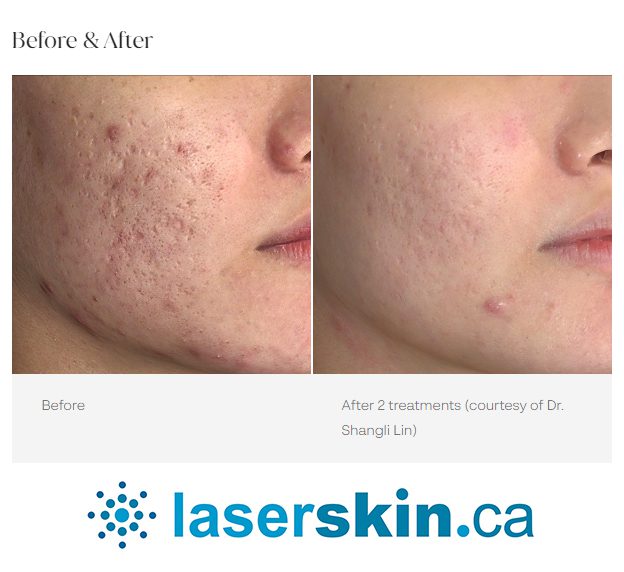
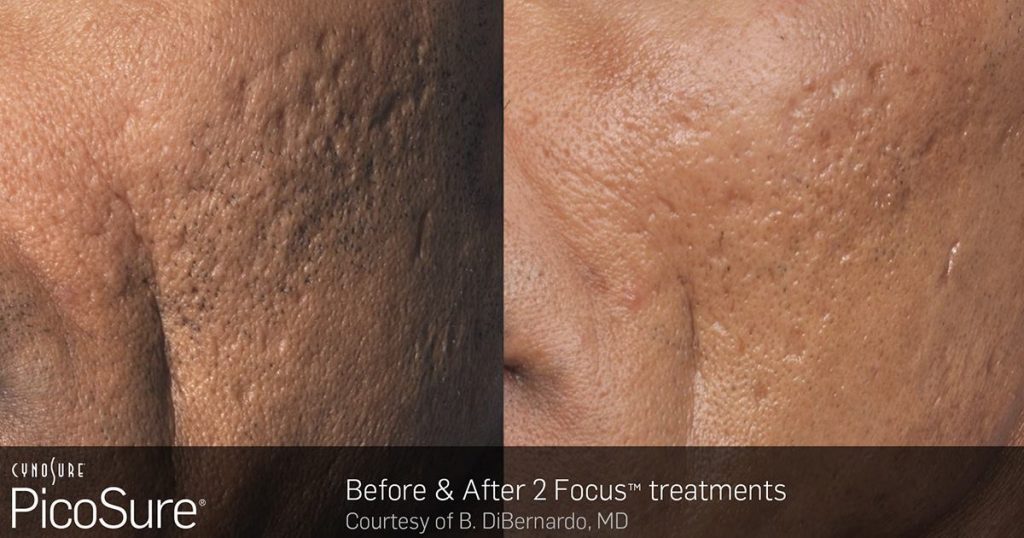
Chemical Peels
Chemical peels use acids to exfoliate the top layer of skin, which can improve the texture and appearance of acne scars. Higher acid concentrations can be used for deeper peels, while lower concentrations are used for milder peels.
Dermabrasion
Dermabrasion is a technique that removes the top layer of skin using a rotating brush, which can enhance the texture and appearance of acne scars.
Punch Excision
Punch excision involves cutting out the scar tissue and stitching the surrounding skin together. This technique is most effective for treating deep, narrow icepick scars.
Subcision
Subcision involves using a needle to break up the scar tissue beneath the skin. This technique is most effective for treating rolling scars.
Fillers
Soft tissue fillers can be injected into the skin to raise depressed scars and improve the skin’s overall appearance. Autologous fat transfer, which involves using the patient’s fat cells, can also be used for this purpose.
Cryotherapy
Cryotherapy involves freezing the scar tissue, which causes it to die and fall off. This technique is most effective for treating raised and keloid scars.
Home Remedies for Acne Scars
While medical procedures are often the most effective treatment option for acne scars, several home remedies can effectively reduce the appearance of acne scars.
Natural Remedies
Natural remedies such as apple cider vinegar, vitamin C, and kojic acid can help improve acne scars’ appearance. These remedies can be applied topically to the skin or taken orally as supplements.
Lifestyle Changes
Changes to one’s lifestyle, such as maintaining a healthy diet, staying hydrated, and refraining from picking or compressing acne, can help to prevent future outbreaks and reduce the risk of scarring.
Choosing the Right Acne Scars Treatment For You
Consultation with a Dermatologist
If you are considering acne scar treatment, it’s essential to consult with a board-certified dermatologist. Your dermatologist can assess your skin and recommend the best treatment option based on your needs and goals.
Cost Considerations
The cost of acne scar treatment can vary depending on the type of treatment, the number of treatment sessions required, and the clinic’s location. Therefore, it’s essential to discuss the cost of treatment with your dermatologist and ensure that you clearly understand the total cost before proceeding with treatment.
Expected Results and Recovery Time
The expected results and recovery time will vary depending on the type of treatment. Some treatments may require multiple sessions to achieve the best results, while others may recover longer. Discussing these factors with your dermatologist and having realistic expectations for the outcome of your treatment is essential.
Q&A for Acne Scars Treatment
What are acne scars, and what causes them?
Acne scars result from skin inflammation caused by acne lesions or blemishes. When acne lesions penetrate the skin’s surface, they can cause damage to a more profound level, including the hair follicles and surrounding tissue. The body’s natural response to this damage is to create new collagen fibres to repair the area, which can result in a scar.
What are the different types of acne scars?
There are several types of acne scars, including atrophic acne scars, which are characterized by depressed areas of skin, and hypertrophic acne scars, which are raised scars. Boxcar scars are another type, usually broad, with well-defined edges. Other types of scars include ice pick scars, which are deep, narrow, and pitted, and rolling scars, which are broader and less defined.
What are the best acne scar treatments available?
The best acne scar treatments depend on the type of acne scars and the severity of the scarring. Some good options for treating acne scars include laser treatments, chemical peels, collagen-induction therapy, and dermal fillers. Injectable treatments, such as hyaluronic acid and soft tissue fillers, can also effectively treat acne scars.
What is collagen-induction therapy, and how does it work?
Collagen-induction therapy is a type of treatment that involves using a device that creates micro-injuries in the skin. This process stimulates the body’s natural healing process and encourages the development of new collagen fibres, which can enhance the appearance of acne scars. The treatment involves a series of treatments over several weeks or months, and it can be an effective way to treat atrophic acne scars.
What is the gold standard for treating acne scars?
The gold standard for treating acne scars is laser resurfacing, a procedure that uses a laser to remove the skin’s surface and promote the growth of new skin cells. This treatment can effectively treat both atrophic and hypertrophic acne scars and improve the appearance of fine lines and sun damage.
What are some of the latest technologies for treating acne scars?
Some of the latest technologies for treating acne scars include intense pulse light (IPL) therapy, pulsed dye lasers, and micro-needling. These treatments can effectively treat post-inflammatory hyperpigmentation and other types of pigmentation issues.
Do over-the-counter acne products work for treating acne scars?
Over-the-counter acne products, such as benzoyl peroxide and lactic acid, can help reduce acne blemishes and prevent new acne. However, they are not typically effective for treating acne scars.
How long does it take for acne scar treatments to produce results?
Depending on the type of treatment and the severity of the scarring, the length of time it takes to see results from acne scar treatments can vary. Some treatments, such as dermal fillers and injectable treatments, can provide instant results, whereas others, such as collagen-induction therapy, may require several weeks or months to demonstrate significant improvement.
What is the price range for acne scar treatments?
The price of acne scar treatments can vary widely depending on the type of treatment, the area being treated, and the expertise of the doctor or skin care specialist. Injectable treatments and chemical peels can cost between a few hundred and several thousand dollars per session, whereas laser treatments can cost several thousand dollars per session.
Is it necessary to have a consultation and sign a consent form before undergoing acne scar treatments?
It is essential to consult with a medical professional or a skin care specialist before undergoing any acne scar treatment. During the consultation, the doctor or specialist will examine the area and discuss the patient’s goals and expectations for the treatment. They will also explain the options and recommend the best treatment plan based on the patient’s needs.
Additionally, the patient should be provided with information about the treatment’s risks and potential side effects, as well as any necessary aftercare instructions. Finally, before undergoing any treatment, the patient should sign a consent form that outlines the details of the treatment, including the risks and benefits, the expected results, and the price.
Can acne scar treatments result in permanent scars?
While acne scar treatments are generally safe and effective, there is always a risk of complications. Sometimes, the treatment can cause scarring or other skin damage. However, if the treatment is performed by an experienced doctor or skin care specialist, the risk of complications is low.
Can acne scar treatments improve the appearance of dark marks or sun damage?
Yes, some acne scars treatments, such as chemical peels and laser resurfacing, can effectively improve the appearance of dark marks and sun damage. These treatments work by removing the surface of the skin and stimulating the growth of new skin cells, which can help to reduce the appearance of pigmentation issues and even out skin tone.
Are there any long-term effects of acne scar treatments?
Some acne scars treatments, such as collagen-induction therapy and laser resurfacing, can stimulate the production of new collagen fibres, improving the overall health and appearance of the skin in the long term. However, the effects of these treatments are temporary, and regular maintenance treatments may be necessary to maintain the results.
Are there any at-home remedies for treating acne scars?
While some at-home remedies may help to reduce the appearance of acne scars, such as masks and exfoliating scrubs, these treatments are generally less effective than professional treatments performed by a doctor or skin care specialist. Additionally, some at-home remedies can cause further damage to the skin if not used properly.
Can anything be done to prevent acne scars from forming in the first place?
The best way to prevent acne scars is to prevent acne lesions from forming. This can be done through good skin care, including regular cleansing and exfoliation and topical acne treatments. Additionally, avoiding picking or squeezing acne lesions can help to prevent scarring.
Q & A About Acne Clinics in Toronto
Where can I find acne laser treatment in Toronto?
There are various clinics in Toronto that offer acne laser treatment. Laser Skin Clinic offers state-of-the-art laser and radiofrequency treatments for acne.
How can I find effective acne scar treatment in Toronto?
To find effective acne scar treatment in Toronto, you can consult with dermatologists or visit specialized acne clinics that offer a range of treatment options, such as laser therapy, chemical peels, microneedling, and dermal fillers.
Are there any clinics in Toronto that specialize in treating acne scars?
Yes, there are clinics in Toronto that specialize in treating acne scars including Laser Skin Clinic. These clinics typically have dermatologists or skincare professionals experienced in addressing acne scars using various techniques and procedures.
What options are available for acne scar treatment in Toronto?
In Toronto, options for acne scar treatment may include laser therapy, chemical peels, microneedling, dermal fillers, subcision, and other innovative procedures tailored to individual needs.
What is the average cost of laser scar removal in Toronto?
The cost of laser scar removal in Toronto can vary depending on factors such as the size and type of scars, the number of sessions required, and the clinic’s pricing structure. It is best to consult with clinics directly for accurate cost estimates.
About Laser Skin Clinic
In Toronto and Richmond Hill, The Laser Skin Clinic is a leading provider of acne scar treatments. The clinic provides a variety of cutting-edge acne scars treatments, such as Potenza RF Microneedling and Picosure Laser. Potenza RF Microneedling employs radiofrequency energy and microscopic needles to stimulate collagen production and promote skin rejuvenation, resulting in finer, more uniform skin texture.
The Picosure Laser treats pigmentation irregularities caused by acne scars, helping to even out skin tone and diminish the scarring’s appearance. The knowledgeable staff at the Laser Skin Clinic employs cutting-edge technology and methods to provide safe and effective treatments that help clients achieve the clear, radiant skin they desire.

